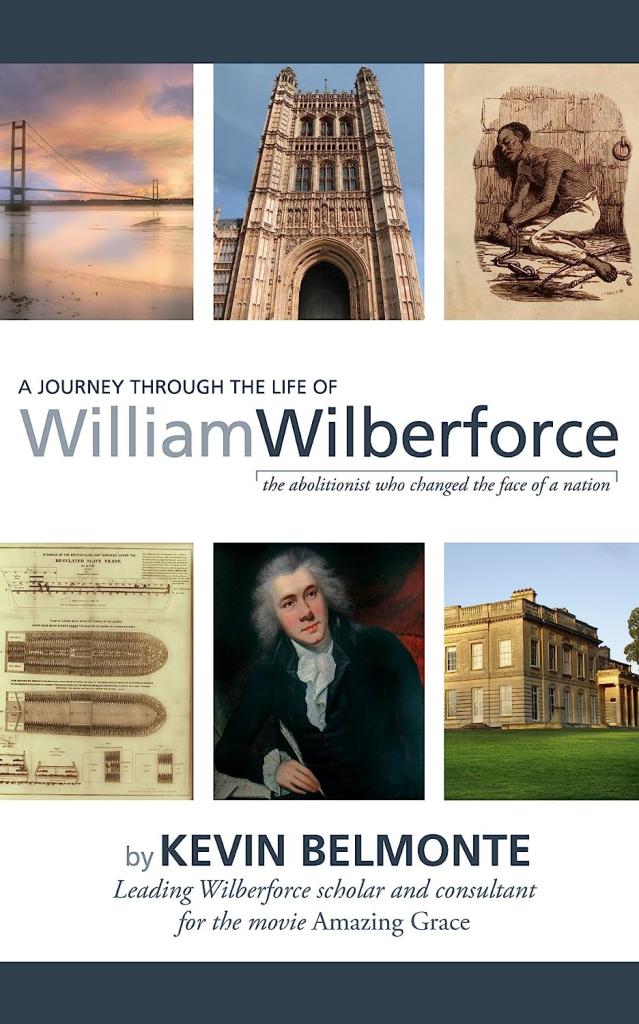Kevin Belmonte, A Journey Through the Life of William Wilberforce, (New Leaf Press, 2007), 122 pp.
Kevin Belmonte has made a writing career out of doing biographies of famous Evangelical and Catholic figures of various eras including Dwight L. Moody, A.J. Gordon, G.K. Chesterton, John Bunyan, and two biographies of William Wilberforce. In this post I am dealing with the smaller Wilberforce book, that accompanied the release of the movie about John Newton.
For a movie basically aimed at Christians, Amazing Grace did amazingly well and rightly so, telling the story of John Newton the former slave trader turned Christian minister and author of the song Amazing Grace. As a result of the movie, there were various spin offs, including the publishing of a very brief biography of William Wilberforce as listed above. It is well written, has lots and lots of pictures and charts and more importantly tells us about William Wilberforce, who in the grand scheme of things is a more important Christian figure for he was mainly responsible for ramrodding through Parliament the abolition of slavery in England, and then thereafter throughout the British Empire. In fact, the new came on Wilberforce’s deathbed in 1833 that Parliament had shelled out millions to plantation owners in Jamaica and elsewhere to liberate their slaves. It’s a moving story and one that was many decades in the making.
William Wilberforce, at an amazingly early age of 21 was elected to the House of Commons. He was very bright, socially among the elite (one of his best friends became Prime Minister— the good Mr. Pitt), and he became an Evangelical Christian, and in due course part of the Clapham sect which was dedicated to the reforming of the ethical and social milieu that prevailed in England. One of the last things John Wesley did in 1791 was to write a letter to Wilberforce encouraging him to persevere until slavery was banned by Parliament, slavery which Wesley famously called ‘the execrable sum of all villainies and offense to God’.
It would take too long to list all the great causes Wilberforce was involved in besides abolition but here are some of them. He wrote a bestseller entitled A Practical View of Christianity, which influenced even the influential like Edmund Burke and Prime Minister Pitt. He funded the building of various churches and chapels. Wilberforce came from a rich merchant family, and he was well able to use his fortune for good causes. He supported missions to India. He helped found the British and Foreign Bible Society, he supported and funded buying people out of debtors prison, he opposed gambling (a vice which ruined one of his sons who had to flee to Europe to escape his debt collectors), he supported the founding of the RSPCA, and the Betterment Society which found ways to help get the poor out of poverty and find them work, he opposed child labor, though that continued to be a major problem until well into Dickens time late in the 19th century and beyond, and I could go on. One estimate says he was involved in 70 charitable causes— 70!!! Like John Wesley. Wilberforce had many friends, many of whom he helped persuade to having both a clearly Evangelical faith, and a commitment to social holiness, including many good causes. One of the main differences between his era (1759-1833) and later into the 20th century, is that there was a rather widespread respect for Christian values, which led both the socially elite and royalty to support Christian causes, and realize they ought to be good Christians. Alas, this is not the ethos of the U.K. in general today.
This book really is just primer on Wilberforce’s life, with many pictures of places he lived, and portraits of himself and his friends. There is only one chapter on his family life, but then he married rather late in life (he was 37, and his wife Barbara 20) but still had some six children and became for the second half of his life a very dedicated family man. His story and example needs to be known and followed today. As John Wesley once said, there is no spiritual holiness without social holiness, and vice versa. The Gospel not merely meant to start or change the church—it is meant to change a fallen world.














